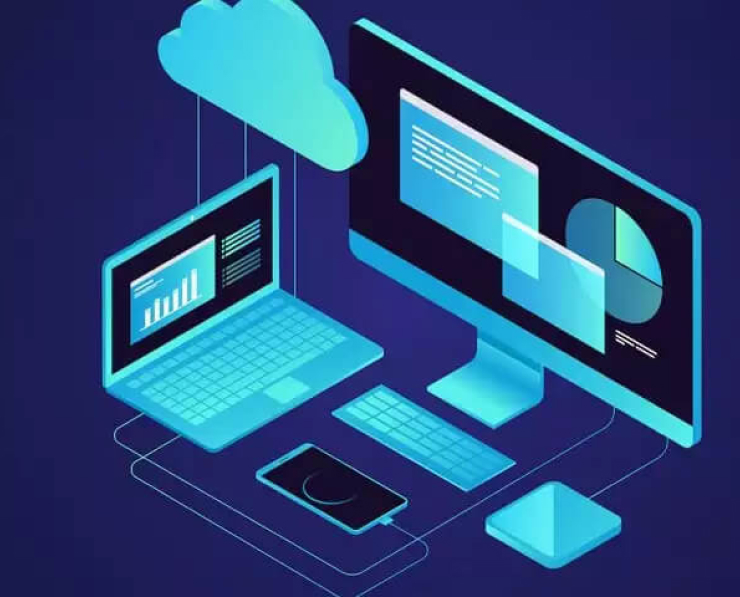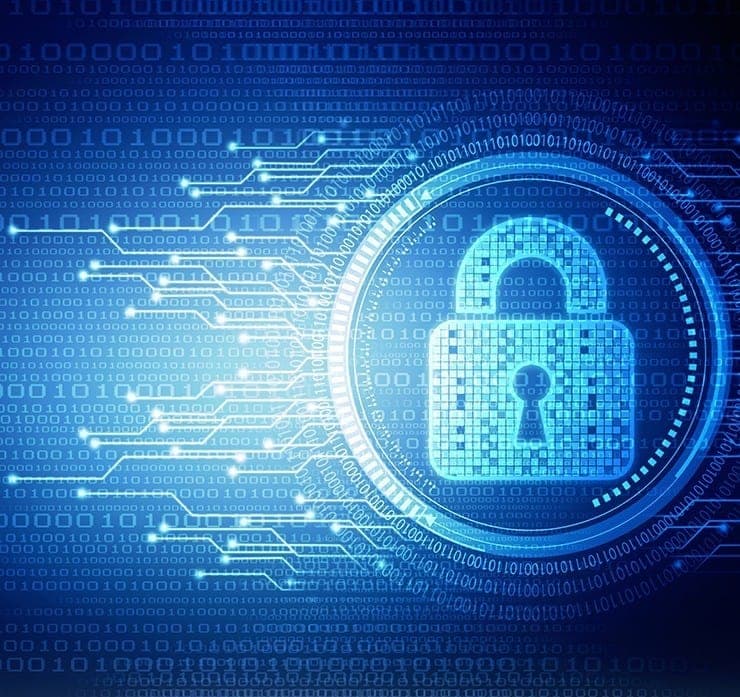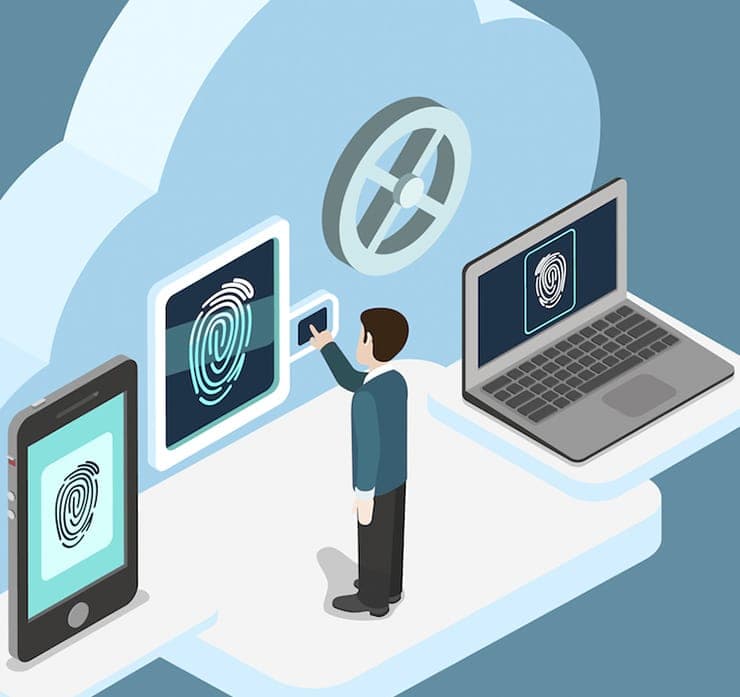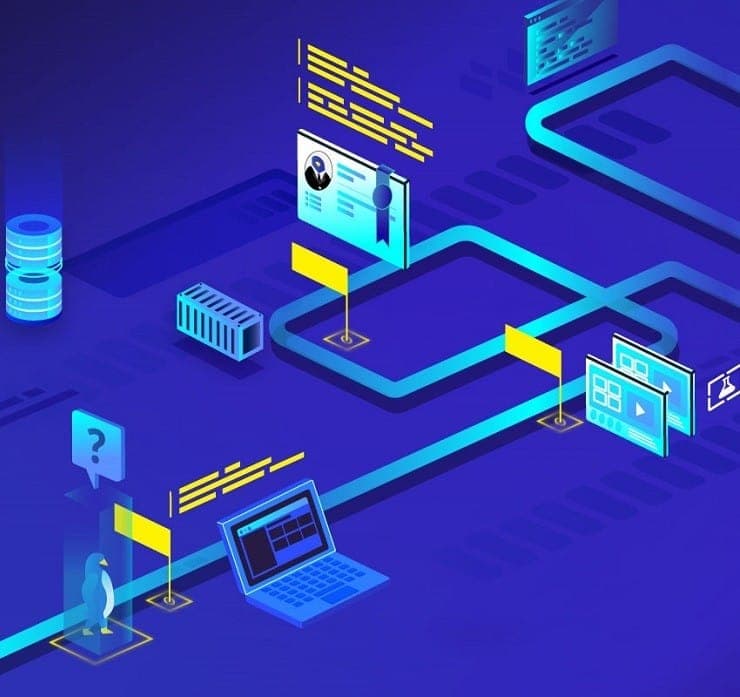Student Feedback
SY0-701: CompTIA Security+ Certification Video Training Course Outline
Chapter 0 - About Security+
Chapter 1 - Risk Management
Chapter 2 - Foundations of Crypt...
Chapter 3 - Physical Security
Chapter 4 - Identity and Account
Chapter 5 - Tools of the Trade
Chapter 6 - Securing Individual ...
Chapter 7 - Securing The Basic LAN
Chapter 8 - Securing Wireless LANs
Chapter 9 - Securing Virtual and...
Chapter 10 - Securing Dedicated ...
Chapter 11 - Secure Protocols an...
Chapter 12 - Testing Infrastructure
Chapter 13 - Business Security I...
Chapter 14 - Dealing with Incidents
Chapter 0 - About Security+
SY0-701: CompTIA Security+ Certification Video Training Course Info
Full CompTIA Security+ SY0-701 Course with Interactive Labs and Exam Preparation
First-Time Pass for Security+ SY0-701 in 30 Days with Complete Training, Labs, and Practice Resources
What you will learn from this course
• Gain a complete understanding of the CompTIA Security+ SY0-701 certification objectives
• Identify different types of cyber attacks and threats that target networks and systems
• Learn practical techniques to secure and protect networks, devices, and data
• Develop hands-on skills through lab exercises to apply cybersecurity concepts in real-world scenarios
• Understand essential networking concepts and IT fundamentals required for Security+ success
• Prepare for the Security+ SY0-701 exam with confidence using structured study methods and practice materials
• Build the foundational cybersecurity knowledge needed for careers in IT security and network defense
Learning Objectives
The main objective of this course is to prepare students to pass the CompTIA Security+ SY0-701 certification exam on the first attempt. By the end of this training, learners will be able to identify security risks, mitigate vulnerabilities, and implement protective measures to safeguard information systems. The course aims to provide a strong understanding of cybersecurity principles, including risk management, threat analysis, incident response, and regulatory compliance. Students will gain practical skills by setting up and working within their own labs, ensuring they can apply concepts to real-world IT environments. Another key learning goal is to help learners build confidence in using security tools and performing tasks that are essential for IT security professionals. This includes recognizing attack vectors, designing secure networks, and implementing security policies that align with industry standards and best practices.
Target Audience
This course is designed for anyone who wants to start or advance a career in cybersecurity. It is ideal for IT professionals, network administrators, and technical support staff who wish to expand their knowledge of security concepts and earn an industry-recognized certification. Beginners looking to enter the field of information security will also find this course valuable, as it provides clear explanations and step-by-step guidance. Individuals preparing for government or private sector roles that require Security+ certification will benefit from the structured training and detailed coverage of exam domains. Whether you are seeking a new career path, a promotion, or a way to validate your existing skills, this course offers the comprehensive instruction necessary to achieve your goals.
Requirements
Students taking this course should have a basic understanding of computers and networking. Familiarity with operating systems, hardware components, and common IT terminology will help in understanding the lessons more effectively. Access to a computer capable of running virtual machines or lab simulations is highly recommended to follow along with the practical exercises. A stable internet connection is needed to stream the training videos and download course materials. No advanced technical experience is required, but a willingness to learn and practice the concepts is essential for success.
Prerequisites
While no formal certifications are required to enroll in this course, having some prior experience in IT support or networking will be helpful. Knowledge of basic networking concepts such as IP addressing, routing, and common protocols provides a solid foundation for learning cybersecurity topics. Students who have completed introductory courses in networking or have on-the-job IT experience will be able to move through the material more quickly. However, the course is structured to guide complete beginners from fundamental concepts to advanced security techniques, making it accessible to learners with diverse backgrounds.
Description
The CompTIA Security+ SY0-701 certification is one of the most respected entry-level credentials in the field of cybersecurity. This course is carefully designed to cover all exam objectives while also giving students the practical skills needed to perform effectively in IT security roles. The training combines clear explanations, real-world examples, and hands-on labs to ensure that learners not only pass the exam but also develop valuable workplace skills. The course begins with the basics of cybersecurity, such as understanding threats and vulnerabilities, and progresses into more advanced topics like architecture design, implementation of secure networks, and incident response strategies. By working through each section and completing the included labs, students will build confidence in identifying risks, deploying security measures, and responding to incidents.
Course Structure and Approach
The training is organized to align directly with the five domains of the Security+ SY0-701 exam: Attacks, Threats, and Vulnerabilities; Architecture and Design; Implementation; Operations and Incident Response; and Governance, Risk, and Compliance. Each domain is covered in depth with multiple video lectures, demonstrations, and practical exercises. Learners will gain an understanding of key concepts such as encryption, authentication, access control, and risk management. Hands-on labs will guide students through configuring security tools, analyzing network traffic, and implementing defensive strategies. The course also includes a full-length practice exam that mirrors the format and difficulty of the real Security+ test, allowing learners to assess their readiness and strengthen their test-taking skills.
Why This Course is Effective
With over 20 years of experience teaching IT and cybersecurity, the instructor provides a proven method of learning that combines theory with practical application. The course eliminates unnecessary distractions by focusing only on the information needed to pass the exam and succeed in the workplace. Students will benefit from engaging teaching techniques, clear explanations, and real-world scenarios that make complex security topics easier to understand. The inclusion of lifetime access and regular updates ensures that learners can revisit the material whenever needed and stay informed about changes to the Security+ exam objectives. This approach not only prepares students for certification but also gives them the skills to protect networks and systems in professional environments.
Building Practical Skills
One of the strengths of this course is the emphasis on hands-on learning. Students are encouraged to set up their own cybersecurity lab using virtual machines or physical hardware. Through guided demonstrations, they will learn to analyze network traffic, detect suspicious activity, and implement security measures such as firewalls, intrusion detection systems, and encryption protocols. These practical exercises help bridge the gap between theoretical knowledge and real-world application, ensuring that students can confidently perform essential security tasks after completing the course.
Path to Certification
Completing this course provides the knowledge and preparation required to take and pass the CompTIA Security+ SY0-701 exam on the first attempt. By mastering the exam objectives and practicing with realistic labs and mock exams, students will be bwell-equippeded to achieve certification. Earning the Security+ credential validates their skills and opens doors to roles such as cybersecurity analyst, security consultant, network administrator, and IT security specialist. The certification is recognized globally and serves as a strong foundation for further advanced certifications in cybersecurity and information assurance.
Course Modules / Sections
This CompTIA Security+ SY0-701 course is organized into carefully structured modules that follow the official exam objectives to provide a complete learning experience. The course begins with an introduction to the fundamentals of cybersecurity and the key principles that form the foundation for all security practices. This opening section provides an overview of the Security+ exam, explaining its structure, question types, and the importance of each domain. Students are guided through the basics of security concepts, including the CIA triad of confidentiality, integrity, and availability, along with the role of cybersecurity in modern IT environments.
The next module focuses on Attacks, Threats, and Vulnerabilities, covering the different types of cyber attacks that organizations face today. Learners will explore malware, ransomware, phishing, denial-of-service attacks, insider threats, and social engineering tactics. Each topic includes detailed explanations of how these attacks work, the indicators of compromise, and the strategies used to defend against them.
Following this, the Architecture and Design module examines how secure networks and systems are built. This section explains enterprise security architecture, secure network design principles, cloud security considerations, and the importance of physical security. Students will learn how to plan, design, and implement layered security measures to protect networks and critical assets.
The Implementation module provides practical guidance on deploying and configuring security solutions. Topics include identity and access management, cryptographic protocols, wireless security, and endpoint protection. Hands-on demonstrations show how to set up firewalls, configure virtual private networks, apply access control policies, and implement encryption techniques.
The Operations and Incident Response module teaches students how to monitor, detect, and respond to security incidents. Learners will study incident response procedures, digital forensics basics, disaster recovery planning, and the use of security tools to analyze logs and network activity. This section helps students develop the ability to identify threats in real time and respond effectively to minimize damage.
The final module, Governance, Risk, and Compliance, explores the policies, laws, and best practices that guide cybersecurity operations. Students will understand risk management frameworks, compliance requirements such as GDPR and HIPAA, and the importance of security policies and audits. This module reinforces the need for organizations to follow industry standards and legal regulations to protect data and maintain trust.
Throughout the course, each module is designed to build on the previous one, ensuring a logical progression from fundamental concepts to advanced security techniques. The combination of theoretical knowledge and practical exercises ensures that students are well prepared for both the Security+ exam and real-world security roles.
Key Topics Covered
The course provides in-depth coverage of every major topic required to master the CompTIA Security+ SY0-701 exam objectives. Among the key topics is a thorough understanding of various cyber threats, including viruses, worms, trojans, and zero-day attacks. Students will learn about threat actors such as hackers, cybercriminals, and nation-state attackers, as well as the motivations and tactics behind different types of attacks. Recognizing these threats is critical to developing effective defense strategies.
Another essential topic is risk management. Students will explore methods for identifying, assessing, and mitigating risks within an organization. Concepts such as vulnerability scanning, penetration testing, and risk analysis are explained with practical examples to help learners apply these techniques in real environments.
Network security is a major focus of the course, covering secure network architecture, segmentation, and defense-in-depth strategies. Learners will study how to protect network devices and data using technologies such as firewalls, intrusion detection systems, virtual private networks, and secure protocols. Wireless security, including WPA3, authentication methods, and wireless intrusion prevention, is also thoroughly addressed.
Cryptography plays a crucial role in modern cybersecurity, and the course offers detailed lessons on encryption algorithms, key management, digital certificates, and secure communication protocols. Students will gain a strong understanding of public key infrastructure, hashing functions, and methods for ensuring data confidentiality and integrity.
Identity and access management is another key area, teaching students how to control user access to systems and data. Topics include multi-factor authentication, single sign-on, privilege management, and access control models such as role-based and mandatory access control. Practical demonstrations guide students in configuring and enforcing security policies to protect sensitive information.
The course also covers incident response, emphasizing the importance of detecting and responding to security events quickly and effectively. Students will learn about security monitoring tools, log analysis, and the stages of incident response, from preparation to recovery. This includes understanding how to contain breaches, conduct forensic analysis, and implement lessons learned to prevent future incidents.
Compliance and governance topics ensure that learners understand the legal and regulatory aspects of cybersecurity. Discussions include data privacy laws, industry regulations, and security frameworks such as NIST, ISO, and PCI DSS. Students will discover how to implement policies and procedures that meet compliance requirements and protect organizational data.
These key topics, combined with real-world scenarios and practical labs, give learners the comprehensive knowledge needed to succeed in the Security+ exam and excel in cybersecurity roles. Each subject is explained in a clear and accessible way, allowing both beginners and experienced professionals to build their skills effectively.
Teaching Methodology
The teaching methodology used in this course is designed to make complex cybersecurity concepts easy to understand and apply. The instructor draws on more than 20 years of IT and cybersecurity experience to deliver engaging, real-world lessons that keep students motivated. The course uses a combination of video lectures, demonstrations, and hands-on labs to ensure that students not only learn the theory but also develop practical skills.
Video lectures provide clear explanations of each topic, supported by visual aids and step-by-step walkthroughs. The instructor uses real-world examples to illustrate key points, helping students connect theoretical concepts to practical situations. By presenting information in a logical sequence, the course allows learners to build their knowledge progressively, starting with foundational principles and moving to advanced security techniques.
Hands-on labs are a core component of the teaching method. Students are encouraged to set up their own cybersecurity lab using virtual machines or cloud-based environments. These labs provide opportunities to configure firewalls, analyze network traffic, implement encryption, and simulate security incidents. By practicing in a controlled environment, students gain valuable experience that prepares them for real-world tasks.
Interactive exercises and practice quizzes are included to reinforce learning and assess understanding of the material. These activities help students identify areas where they need more practice and provide immediate feedback to support continuous improvement. The combination of lectures, labs, and interactive elements creates a dynamic learning experience that appeals to different learning styles.
Another important aspect of the teaching methodology is the focus on exam preparation. The course includes a full-length practice exam that mirrors the format and difficulty of the actual Security+ SY0-701 test. This allows students to become familiar with the exam environment and develop effective test-taking strategies. The instructor also provides tips for managing time during the exam and approaching different types of questions, such as multiple-choice and performance-based tasks.
Regular updates ensure that the course content remains current with the latest Security+ objectives and industry best practices. Lifetime access allows students to revisit lessons as needed, making this course a valuable resource for both exam preparation and ongoing professional development.
Assessment & Evaluation
Assessment and evaluation in this course are designed to measure student progress and readiness for the Security+ SY0-701 exam. Throughout the training, students will encounter practice questions, quizzes, and lab exercises that test their understanding of key concepts. These assessments provide immediate feedback, allowing learners to identify areas that require further review.
Each module concludes with a set of review questions that cover the main topics discussed in that section. These quizzes help reinforce learning and ensure that students can apply the knowledge they have gained. By consistently evaluating their performance, learners can track their improvement and focus their study efforts more effectively.
The course includes a comprehensive full-length mock exam that closely resembles the actual Security+ test. This practice exam features a variety of question types, including multiple choice and performance-based scenarios, to simulate the real testing experience. Taking the practice exam helps students build confidence, improve their time management skills, and identify any remaining weaknesses before scheduling the official test.
Lab assignments play a key role in evaluation by requiring students to demonstrate their ability to implement security measures and analyze real-world scenarios. These practical tasks test not only theoretical knowledge but also hands-on skills, ensuring that learners are capable of applying cybersecurity techniques in professional environments.
The instructor encourages students to review their quiz and exam results carefully to pinpoint areas of difficulty. Detailed explanations are provided for all practice questions, helping learners understand why certain answers are correct and reinforcing important concepts. By combining regular assessments with practical exercises, the course provides a balanced approach to evaluation that prepares students thoroughly for the Security+ exam.
Ultimately, the goal of assessment in this course is not just to measure knowledge but to ensure mastery of the skills required for certification and professional success. Students who complete the modules, labs, and practice exams will have the confidence and competence needed to pass the CompTIA Security+ SY0-701 exam and begin or advance their careers in cybersecurity.
Benefits of the Course
Enrolling in this CompTIA Security+ SY0-701 course provides numerous benefits for students looking to establish or advance a career in cybersecurity. The course is designed to deliver a complete understanding of all exam objectives while also equipping learners with practical, hands-on skills. One of the primary benefits is the ability to pass the Security+ exam on the first attempt. The course is structured with a focused study plan, covering essential topics in detail and providing practice exams that mirror the real test environment. This ensures that students are well-prepared and confident when taking the certification exam.
Another significant benefit is the development of practical cybersecurity skills that can be applied immediately in professional settings. Through hands-on labs and guided exercises, learners gain experience configuring security tools, analyzing network traffic, implementing encryption, and responding to security incidents. This real-world experience is critical for IT professionals who want to demonstrate their capabilities to employers.
The course also enhances knowledge of risk management and compliance, enabling students to understand the regulatory and policy requirements that govern cybersecurity operations. By learning how to implement security policies, conduct audits, and maintain compliance with industry standards, students become valuable assets to organizations seeking to protect sensitive data and meet legal obligations.
Additionally, this course is designed to be accessible to both beginners and experienced IT professionals. Beginners gain a clear and structured introduction to cybersecurity, while experienced individuals can expand their existing knowledge and stay current with the latest Security+ exam objectives. The combination of theory, practical exercises, and exam-focused strategies ensures that all learners achieve meaningful outcomes.
Another benefit is the lifetime access to course materials. Students can revisit lessons, review labs, and retake practice exams whenever needed, allowing continuous learning and mastery of concepts. Regular updates to the course ensure that content remains aligned with the latest Security+ objectives and industry practices. Learners also receive a certificate of completion, which can be added to resumes or LinkedIn profiles to showcase their expertise and dedication to professional growth.
This course emphasizes a structured approach to cybersecurity learning. The content is organized to build foundational knowledge first, followed by progressively more advanced topics. This method helps learners retain information effectively, develop problem-solving skills, and gain confidence in their ability to handle security challenges. By focusing on practical applications and real-world scenarios, students gain insights into how cybersecurity principles are applied in organizations of all sizes.
The combination of instructor-led guidance, interactive labs, and extensive practice exams provides a comprehensive and engaging learning experience. Students benefit from clear explanations, demonstrations, and examples that illustrate the concepts in context. This approach not only prepares them for the Security+ exam but also builds the skills needed for ongoing professional development and career advancement in IT security.
Course Duration
The CompTIA Security+ SY0-701 course is designed to provide over 25 hours of detailed training, allowing learners to study at a steady and thorough pace. Each module is broken into digestible segments, ensuring that students can focus on specific topics and gradually build expertise. Depending on the individual’s prior knowledge and learning speed, the course can be completed in a few weeks or over several months.
The structured pace of the course is intended to maximize retention and practical application of concepts. Students have the flexibility to revisit any section, practice lab exercises, or retake quizzes as needed. By following the recommended study plan, learners can efficiently cover all five exam domains, including Attacks, Threats, and Vulnerabilities; Architecture and Design; Implementation; Operations and Incident Response; and Governance, Risk, and Compliance.
Hands-on labs are integrated throughout the course, providing a practical component that complements theoretical learning. Each lab is designed to take a reasonable amount of time while allowing students to explore security tools and techniques in depth. By balancing video lectures with interactive exercises, learners can maintain engagement and develop practical skills while progressing steadily through the course.
The inclusion of a full-length practice exam is a key feature of the course duration. This exam allows students to simulate the experience of the real Security+ test, assess their knowledge, and identify areas that require additional study. By scheduling time for practice exams and review, learners can ensure that they are fully prepared for the certification test.
The flexible access to course materials means that students can adapt the duration of study to their personal schedules. Whether learning part-time or committing to full-time study, the course is structured to provide an effective path to mastering Security+ concepts within a reasonable timeframe. Regular updates and lifetime access also allow students to revisit the content at any point, ensuring that their knowledge remains current even after completing the initial course duration.
Tools & Resources Required
To fully benefit from this course, students will need access to several essential tools and resources. A computer or laptop with sufficient processing power and memory to run virtual machines or security labs is recommended. These labs will allow learners to practice network configuration, implement security measures, and simulate cyber attacks in a controlled environment. Using virtual machines enables students to safely experiment with different operating systems and software without affecting their primary system.
A stable internet connection is necessary to stream video lectures, download course materials, and access online resources. Students will also require software such as virtualization platforms, network simulation tools, and security applications that are commonly used in IT and cybersecurity roles. The course guides setting up these tools and using them effectively in lab exercises.
Students should also have access to the official CompTIA Security+ exam objectives, which are provided as a downloadable PDF. This resource allows learners to track their progress and ensure that they are covering all required topics. Additional reference materials, such as documentation on security protocols, compliance frameworks, and best practices, are recommended to supplement the course content.
For note-taking and organization, students may use digital or physical notebooks to record key concepts, lab observations, and exam preparation tips. Keeping a structured record of learning enhances retention and provides a useful resource for review before taking the certification exam.
Finally, the course emphasizes the importance of a dedicated learning environment. Students are encouraged to set aside regular study time, minimize distractions, and follow the structured course plan to maximize their chances of success. Combining these tools and resources with the comprehensive training provided in the course ensures that learners can effectively prepare for the Security+ SY0-701 exam and gain valuable skills for a career in cybersecurity.
The combination of guided lectures, hands-on labs, and recommended tools and resources creates a complete learning ecosystem. Students not only acquire theoretical knowledge but also develop practical skills that can be applied in real-world IT and cybersecurity roles. By using the tools and resources provided, learners gain confidence in configuring secure networks, analyzing threats, and implementing protective measures that meet industry standards.
Career Opportunities
Completing the CompTIA Security+ SY0-701 certification opens a wide range of career opportunities in the field of IT and cybersecurity. This certification is globally recognized and serves as a foundation for numerous professional roles in information security. Security+ demonstrates to employers that the individual has the knowledge, skills, and practical abilities to secure networks, protect systems, and respond effectively to cyber threats.
One of the primary career paths for Security+ certified professionals is that of a cybersecurity analyst. In this role, individuals monitor networks for suspicious activity, analyze security incidents, and implement measures to prevent breaches. Analysts work in a variety of organizations, including corporate IT departments, government agencies, and managed security service providers. They are responsible for maintaining the integrity, confidentiality, and availability of information systems.
Another potential role is a network security engineer. These professionals design, implement, and maintain secure network infrastructures. They configure firewalls, virtual private networks, intrusion detection systems, and other security tools to protect organizational data. Network security engineers are also involved in vulnerability assessment and penetration testing, ensuring that network defenses are effective against potential attacks.
Security+ certification also prepares students for roles such as IT security consultant or information security specialist. These positions involve assessing organizational security policies, identifying risks, and recommending solutions to enhance overall security posture. Professionals in these roles may conduct audits, develop security strategies, and provide training for employees on best practices for information security.
Additionally, Security+ can serve as a stepping stone for careers in cybersecurity management. Individuals who gain experience in technical roles can advance to positions such as security administrator, cybersecurity manager, or risk and compliance officer. These positions involve strategic planning, risk assessment, policy development, and oversight of security operations within organizations.
Government and military positions often require Security+ certification as a baseline qualification. Professionals in these roles may work in cybersecurity defense, intelligence analysis, or IT operations, contributing to national security initiatives and protecting sensitive government information.
Other roles that benefit from Security+ certification include systems administrator, penetration tester, and incident response analyst. Systems administrators with Security+ credentials are equipped to manage and secure enterprise IT environments, ensuring systems remain protected against threats. Penetration testers use their skills to identify vulnerabilities and strengthen defenses, while incident response analysts focus on investigating and mitigating security breaches.
The certification also provides opportunities for freelance and consulting work. Security+ professionals can offer expertise to organizations of varying sizes, assisting with compliance, security assessments, and implementing effective cybersecurity measures. The demand for qualified security professionals continues to grow as organizations recognize the importance of protecting their digital assets from evolving cyber threats.
In addition to specific job roles, Security+ certification enhances overall career prospects by validating a professional’s commitment to continuous learning and mastery of cybersecurity fundamentals. It provides a strong foundation for pursuing advanced certifications such as Certified Information Systems Security Professional (CISSP), Certified Ethical Hacker (CEH), or Cisco Certified CyberOps Associate. These advanced credentials further expand career opportunities and potential earning potential.
By completing this course, students gain the knowledge, practical experience, and confidence needed to succeed in various cybersecurity roles. Employers value the combination of theoretical understanding, hands-on skills, and certification that Security+ provides. Graduates are well-positioned to secure meaningful, high-demand positions in IT and cybersecurity, contributing to the protection and resilience of organizations in a digitally connected world.
Conclusion
The CompTIA Security+ SY0-701 course is a comprehensive program designed to equip students with both the knowledge and practical skills necessary to succeed in the field of cybersecurity. Covering all exam objectives in depth, the course ensures that learners are fully prepared to pass the Security+ certification exam on their first attempt. Through a structured approach that combines video lectures, hands-on labs, and practice exams, students gain a thorough understanding of key topics such as threats and vulnerabilities, secure network architecture, risk management, cryptography, identity and access management, incident response, and compliance.
The course methodology emphasizes practical application of concepts, allowing learners to build a personal lab environment where they can implement security measures, analyze network traffic, and respond to simulated security incidents. This hands-on approach bridges the gap between theoretical knowledge and real-world skills, ensuring that students are ready to tackle challenges in professional IT and cybersecurity roles. The inclusion of practice exams, quizzes, and assessments reinforces learning and provides the confidence needed to perform successfully on the certification test.
Completing this course not only prepares students for the Security+ exam but also opens doors to a wide range of career opportunities. Graduates are qualified for roles such as cybersecurity analyst, network security engineer, IT security consultant, systems administrator, penetration tester, and incident response analyst. The certification is recognized globally and is highly valued by employers across industries, making it a critical step for individuals pursuing a career in cybersecurity.
The benefits of this course extend beyond exam preparation. Students develop skills that are directly applicable to professional environments, gain knowledge of industry best practices, and become familiar with the tools and technologies used to secure networks and systems. Lifetime access to course materials ensures that learners can continue to review and update their knowledge as cybersecurity practices evolve.
This course is ideal for IT professionals, aspiring cybersecurity specialists, and anyone seeking to enhance their technical expertise and career prospects. By following the structured modules, completing hands-on labs, and utilizing the resources provided, students will acquire the confidence, skills, and certification necessary to succeed in the fast-growing field of cybersecurity.
Enroll Today
Take the next step in your cybersecurity career by enrolling in this comprehensive CompTIA Security+ SY0-701 course. With expert guidance, practical labs, and a full exam preparation strategy, this course provides everything you need to pass the Security+ certification and advance your professional opportunities. Start learning today and gain the knowledge, hands-on experience, and confidence to secure your place in the high-demand world of IT security.













